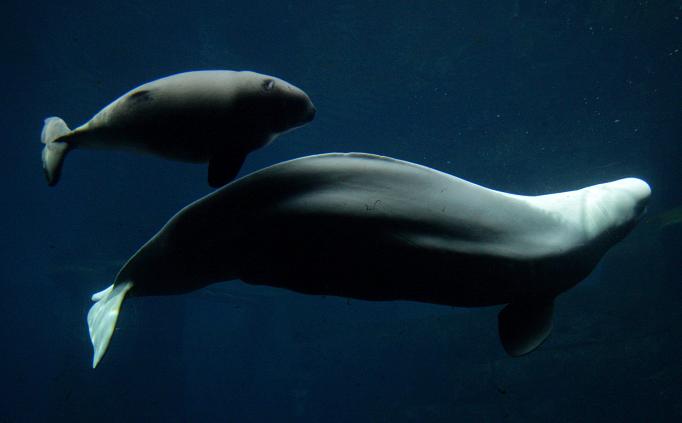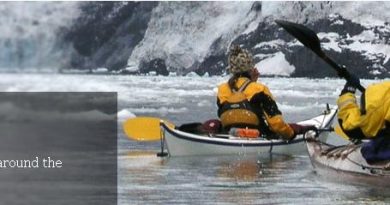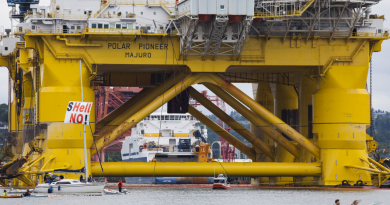100 beluga whales trapped off Chukotka
 Off the east coast of Chukotka’s peninsula, winter has come hard and fast, freezing parts of the Bering Strait. Fifteen miles south of the village of Yanrakynnot in the Sinyavinsky Strait, 100 beluga whales are trapped in the ice. Hunters have reported that they are in two polynyas and are currently able to breathe freely. However, food and clean water will soon run out, and the whales will likely die of exhaustion or starvation if the ice is not soon broken up.
Off the east coast of Chukotka’s peninsula, winter has come hard and fast, freezing parts of the Bering Strait. Fifteen miles south of the village of Yanrakynnot in the Sinyavinsky Strait, 100 beluga whales are trapped in the ice. Hunters have reported that they are in two polynyas and are currently able to breathe freely. However, food and clean water will soon run out, and the whales will likely die of exhaustion or starvation if the ice is not soon broken up.
Roman Kopin, governor of Chukotka, has written letters to the Ministry of Transport and the Ministry of Emergency Situations requesting an icebreaker to aid the beluga whales. He suggested the marine rescue boat Ruby as a possible source of salvation for the whales. It is a couple of days away, busy helping a Korean cargo ship Oriental Angel, which has run aground on the Gulf of Anadyr. All of its 90 crew members managed to escape on inflatable boats, but there are still 1,100 gallons of flammable liquid onboard the ship. Meanwhile, Chukotka authorities are busy trying to find out how far away the nearest source of clean water is from the whales.
Not always possible to save trapped whales
Beluga whales, which are not endangered, occasionally become trapped within the ice, but it is rare that humans discover the incidents in time to help save the animals. The reasons for why they become trapped range from sudden severe weather to disorientation. In 1986, an icebreaker off Chukotka rescued dozens of trapped belugas. Yet in 2006, when somewhere between 20 and 80 belugas were trapped within the frozen Husky Lakes south of Tuktoyaktuk, the local Inuvialuit decided to hunt them. Though they normally swim out of the lakes and back to the ocean before the freeze-up, a storm had suddenly frozen the waterway. The length and depth of the lakes, which form a 25-mile chain up to 100 feet deep in parts, made rescue impossible. The belugas only had one breathing hole, around which the Inuvialuit stood to harpoon the whales and pull out their bodies. Since the belugas likely would have died anyway, it was decided that it would be more humane to kill them quickly – a “mercy kill” – and make use of their meat, which can sustain Inuvialuit families through the winter. The local government paid hunters $79,000 to kill 39 of the trapped whales.
The following year, 80 beluga whales were similarly entrapped in the same place. However, the government decided to neither try to rescue them nor kill them, instead trying to see what effect it would have on beluga whales the following year. Paul Voudrach, chairman of the Tuktoyaktuk hunters and trappers committee, said, “When they die in the Husky Lakes… these other whales will maybe not come back to the area, because death is in the area.”
What happens in Chukotka will depend on how far away the nearest source of open water is and how quickly the Ruby can get to the site of the trapped whales. In any case, the entrapment of the belugas and the grounding of the Oriental Angel show how dangerous the Arctic can be for animals and humans alike.
News Links
“Belugas trapped in icy Arctic waters at risk of death,” CNN
“Operation resumes to rescue South Korean trawler in Chukotka,” Voice of Russia
“Hunters harvest whales trapped in ice,” MSNBC
“No intervention on trapped Belugas in Husky Lakes,” CBC




